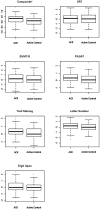Cognitive function in multiple sclerosis improves with telerehabilitation: Results from a randomized controlled trial
- PMID: 28493924
- PMCID: PMC5426671
- DOI: 10.1371/journal.pone.0177177
Cognitive function in multiple sclerosis improves with telerehabilitation: Results from a randomized controlled trial
Erratum in
-
Correction: Cognitive function in multiple sclerosis improves with telerehabilitation: Results from a randomized controlled trial.PLoS One. 2018 Jan 30;13(1):e0192317. doi: 10.1371/journal.pone.0192317. eCollection 2018. PLoS One. 2018. PMID: 29381774 Free PMC article.
Abstract
Cognitive impairment affects more than half of all individuals living with multiple sclerosis (MS). We hypothesized that training at home with an adaptive online cognitive training program would have greater cognitive benefit than ordinary computer games in cognitively-impaired adults with MS. This was a double-blind, randomized, active-placebo-controlled trial. Participants with MS were recruited through Stony Brook Medicine and randomly assigned to either the adaptive cognitive remediation (ACR) program or active control of ordinary computer games for 60 hours over 12 weeks. Training was remotely-supervised and delivered through a study-provided laptop computer. A computer generated, blocked stratification table prepared by statistician provided the randomization schedule and condition was assigned by a study technician. The primary outcome, administered by study psychometrician, was measured by change in a neuropsychological composite measure from baseline to study end. An intent-to-treat analysis was employed and missing primary outcome values were imputed via Markov Chain Monte Carlo method. Participants in the ACR (n = 74) vs. active control (n = 61) training program had significantly greater improvement in the primary outcome of cognitive functioning (mean change in composite z score±SD: 0·25±0·45 vs. 0·09±0·37, p = 0·03, estimated difference = 0·16 with 95% CI: 0·02-0·30), despite greater training time in the active control condition (mean±SD:56·9 ± 34·6 vs. 37·7 ±23 ·8 hours played, p = 0·006). This study provides Class I evidence that adaptive, computer-based cognitive remediation accessed from home can improve cognitive functioning in MS. This telerehabilitation approach allowed for rapid recruitment and high compliance, and can be readily applied to other neurological conditions associated with cognitive dysfunction.
Trial registration: Clinicaltrials.gov NCT02141386.
Conflict of interest statement
Figures



References
-
- Rocca MA, Amato MP, De Stefano N, Enzinger C, Geurts JJ, Penner IK,.et al. Clinical and imaging assessment of cognitive dysfunction in multiple sclerosis. The Lancet Neurology. 2015; Published online 2.5.15. - PubMed
-
- Rosti-Otajarvi EM, Hamalainen PI. Neuropsychological rehabilitation for multiple sclerosis. The Cochrane database of systematic reviews. 2011;(11):CD009131. - PubMed
Publication types
MeSH terms
Associated data
LinkOut - more resources
Full Text Sources
Other Literature Sources
Medical

